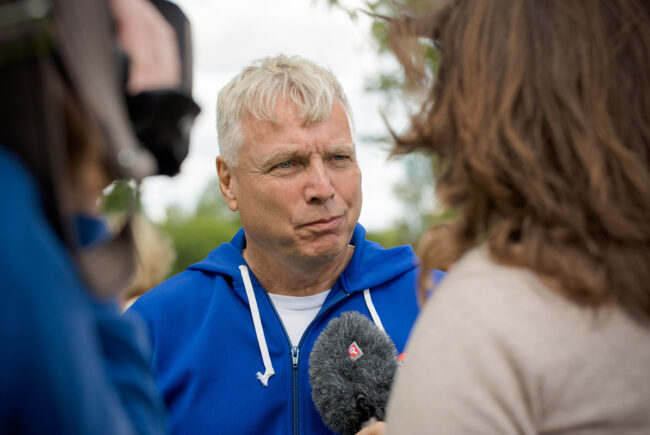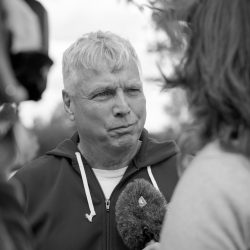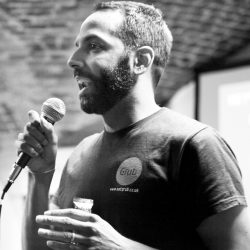

Climate change changes everything. Politics and education should change accordingly, believes Uffe Elbaek, leader of Danish green political party Alternativet. / Photo: Alternativet
Climate change changes everything. Politics and education should change accordingly, believes Uffe Elbaek, leader of Danish green political party Alternativet. / Photo: Alternativet
Stopping climate change requires innovations from across all sectors of society. In this article, a growing business, a political party and a civil society initiative share their views on learning and activism.
Living in our era of climate change calls for new thinking and initiatives across all sectors of society. In this article a Danish green political party The Alternative, a Finnish civil society NGO Climate Parents and Eat Grub, a food business, share their insights on learning and activism on climate.
Alternativet

Uffe Elbaek, founder and leader of The Alternative is a politician and entrepreneur. He is former Danish Minister of Culture.
Alternativet, the Alternative, is a Danish green political party, launched in 2013. The Alternative crowdsourced its political programme through “political labs” across the country. The programme calls for a radical transition to an ecologically sustainable society, beyond the current economic growth paradigm.
Uffe Elbaek, what is The Alternative´s mission?
“When I founded The Alternative less than four years ago it was with an ambition to create a new political culture based on participation and solutions over conflicts. Not only did we crowdsource our political program through political laboratories throughout Denmark, we also agreed to be based on values instead of ideologies and measure all of our initiatives and proposals on a triple bottom line -social, environmental and economic – instead of just the economic bottom line.
As the climate crisis is the most urgent crisis we face as humanity, we aspire to not only address the climate crisis through our political program but to engage as many citizens as we can in the serious sustainable transition towards 100 percent renewable energy.”
How did you personally become convinced of the risks of climate change?
“The science is so clear that I didn’t really need to be convinced. I believe in science and the change in the world’s climate that we can already see. But what got me to act on what science tells us, is the obligation I feel to my four grandchildren. I want to be able to look them in their eyes as they grow up and say that I did what I could to combat climate change. When we are the first generation to experience climate change, but the last to have the chance to do something about it, we must act. End of discussion.”
How do you learn about climate change?
“I use a wide variety of learning resources. The book “Occupy World Street” by Ross Jackson has been a great inspiration for me. The same goes for “The Great Transition” by Jørgen Steen Nielsen, one of the most experienced climate journalists in Denmark.
I am also inspired by activism, fashion and the arts. I love how fashion designer Vivienne Westwood addresses climate change in her work.
I stay up-to-date on the latest science through Twitter, newspapers as the Guardian, sites like Adbusters and green NGOs as Greenpeace. I also use the action oriented online media created by The Alternative called Altivisten.”
In what ways does The Alternative educate citizens about climate?
“As a green party and movement, pretty much everything we do is about spreading understanding of climate change and how we can act in new ways on both a personal level and as communities, corporations and societies. For example I just took part in a challenge to only eat vegan for 22 days.”
The Alternative strives for a “controlled sustainable transition.” Does this mean a zero growth economy?
“Zero growth economy is not a goal for The Alternative. Instead, we are very clear about wanting dramatically less growth in sectors like the fossil fuel industry and dramatically more growth in sectors contributing to the green transition. As we have shown in Denmark for decades, green transition is not a threat but a condition to a Nordic-style welfare society: the growth of the green economy is helping us to sustain the welfare state.”
In your view, what kind of a learning process is required of citizens to really move into a sustainable society?
“The climate crisis changes everything and it should also change the way we learn.
The Alternative have proposed a reframing and renaming of the subjects taught in elementary schools so they much more clearly address the move towards a sustainable society. We believe the learning process has to begin early and be in-depth for all citizens.”
Climate Parents

Sampo Koistinen is chairman of Climate Parents. He works in the role on a volunteer basis.
Ilmastovanhemmat, Climate Parents, is a Finnish NGO aiming to lobby politicians and raise awareness on climate change. The association was founded by ordinary citizens, parents concerned of the effects of climate change in their children´s lifetime.
What is Climate Parents all about?
“Climate Parents is an organization consisting of fathers, mothers, grandparents, godparents and other people who have children in their lives. We demand that decision makers heed the consensus of climate scientists and do brave politics to prevent a climate disaster.
I see us as a climate activist group that is easily approachable. We are not political or technical specialists, but ordinary people worried about climate change.
We always refer to future generations in our petitions to policy makers, and to the fact that our offspring is innocent of the mess we are leaving behind. Not to forget the fact that the changing climate already currently affects people and fauna, all around the world.”
How did you personally become convinced of the risk of climate change to the planet?
“I can’t recall any single personal turning point. For the past 15 years I have been increasingly concerned about it and astonished that national and international actors fail to respond to the crisis in a sufficient way. It is easy to be convinced of climate change in light of all the scientific evidence in the past decades. I can’t imagine that in any other sector we would be so passive in the face of such clear and present danger.”
How do you keep learning about climate change?
“Finnish writers such as Antti Salminen and Tere Vadén are good for an analysis of our culture’s relationship to cheap fossil energy.
Climate skeptics should read the Skeptical Science website. And IPCC reports are essential basic reading! And the FAQ section of our website, in Finnish only at the moment.”
In what ways do you spread understanding and knowledge about climate change in your work with Climate Parents?
“We primarily try to influence politicians and other national decision makers. We contact them, and remind them of facts they should already know and urge them to make responsible decisions. Many of them still do not grasp that with climate change we are dealing with mankind’s perhaps biggest threat. Many of those who do understand this do not make this understanding manifest in their decisions.
We also take part in public debate in different events and media. In these instances we try to tap into the love most people feel for fellow men and fellow beings, but we are not shy of reminding of the urgency of responsible climate politics.”
Eat Grup

Shami Radia is co-founder of Eat Grub.
Eat Grub is a UK food company producing and selling insect food and ingredients. Their business has a strong advocacy element on the health and climate benefits of an insect diet. Shami Radia is a co-founder of Eat Grub.
Please introduce Eat Grub and its mission in a few words. How do you see your mission in relation to climate change?
“Eat Grub’s mission is to get more people in the West, predominantly in the UK at the moment, eating insects and becoming more aware of the environmental benefits of doing so. Although it may be small steps in the right direction, by beginning to change people’s perceptions and educating them on the sustainability of eating insects, it will gradually contribute to helping the environment.”
How did you personally become convinced of the risk of climate change to the planet?
“I used to work for the international development charity, WaterAid. It was while working for this charity that I first tried insects, termites, in Malawi. I also heard of the impact livestock farming was having on our world’s precious resources like water and land. During one talk, someone mentioned insects as an environmentally friendly source of protein because they require just a fraction of the resources used in traditional livestock farming.”
What are your current learning resources on climate change?
“We use a variety of sources to help us understand the benefits that insects can have on the environment. The UNFAO were one of the first world bodies to advocate insect consumption and have released some fantastic reports. The journal, Global Food Security, is another well respected source of information and they recently published some updated research supporting the fact that insects can be a far more sustainable source of protein for our growing needs.”
How do you spread understanding about climate change in your own work?
“On the back of our energy bar packets that we sell and on any leaflets that we give out to the public, there are numerous facts about the environmental benefits of eating insects. We are also keen to educate the public in person about these benefits when we’re at events or sampling sessions.
In the future, we would like to create some resources for schools in the hope that educating children will normalise the concept of eating insects for the next generation.”
In your view, what does it take for us to seriously introduce insects into our daily Western diets?
“The best way to introduce insects into a Western market is probably to concentrate on them in a way that is easily accessible to the consumer, hence our energy bars. The bars allow people to try insects without purchasing a lot of ingredients and being unsure about how to cook them. And as I have said, it is also important to educate the public about the sustainable and nutritional side of eating insects.”






